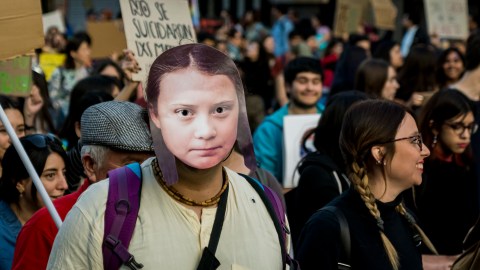The ‘Greta effect’: Can Thunberg’s activism actually change policy?

Agencia Makro / Contributor
- Greta Thunberg is the 16-year-old Swedish climate activist who recently criticized United Nations members for failing to do more on climate change.
- Since her speech and the global climate strikes last week, Austria’s Green Party saw a surge in support, while Canadian Prime Minister Justin Trudeau saw a drop in support among young Canadians.
- Thunberg has received waves of criticism since her speech.
After inspiring global climate strikes and chiding United Nations members over their inaction on climate change, activist Greta Thunberg has successfully conjured a new sense of urgency over climate change, especially among young people across the globe. Still, it remains unclear whether the activism she’s inspired will actually change climate policies.
In Europe, there are some early signs that nations might soon have a better chance of passing significant emissions regulations, possibly due to a “Greta Thunberg effect,” as Bloomberg suggests. The most striking evidence comes from Austria, where results from an election on Sunday showed that support for the Green Party had tripled, scoring 14 percent of the vote. Austria’s conservative People’s Party remains in power, but the surprise results position the Greens as a potential coalition partner.
“The thematic development really helped the Greens, I’m thinking here of Greta Thunberg and the climate protests,” Social Democrats Managing Director Thomas Drozda said in an ORF television interview. “This is an area where the Greens have had credibility for the last 20 or 25 years.”
Meanwhile, German Chancellor Angela Merkel, who posted to Instagram a photo of herself speaking with Thunberg, is seeking to position herself as a leader on climate change in her nation and the European Union. In July, Merkel said Thunberg and other young activists are speeding up efforts to pass climate policies in Europe.
“The seriousness with which Greta, but also many, many other young people, are telling us that this is about their lives, and that their life spans extend further, has led us to approach the matter more resolutely,” Merkel said.
In September, Merkel and several other E.U. nations endorsed a climate package that aimed to end greenhouse gas emissions by 2050, but the effort was blocked by Poland.
Canadian Prime Minister Justin Trudeau also seemed to want to position himself as a leader on climate action. But in the wake of a meeting he had with Thunberg, during which the 16-year-old activist said he wasn’t doing enough on climate change, Trudeau’s support among young voters dropped by more than 10 percent, according to polling data from Nanos Research.
“I think we’re going to call this the Greta Thunberg effect,” Nik Nanos said on CTV’s “Trend Line” podcast. “What’s it like to have Greta Thunberg tell the prime minister … ‘You’re not doing enough?'”
But while Thunberg has been criticizing world leaders over climate inaction, the young activist, who’s been diagnosed with Asperger’s syndrome, has been attacked and slandered online and in the media. The bulk of these attacks come from right-wing critics, who have generally gone after her indignant tone, or suggested that she’s being exploited by the politically motivated adults around her.
On the more extreme side, internet trolls have photoshopped images of Thunberg, including one that depicts her with the American financier George Soros, another that suggests she supports the Islamic State, and one doctored photo showing her eating lunch next to starving children.
Of course, not all of Thunberg’s critics were unreasonable or malicious. For example, Reason‘s Nick Gillespie suggested that the activist’s “histrionics” were counterproductive to developing good climate change policy. Jake Novak, writing for CNBC, took issue with the fact that Thunberg “and the adults guiding her, are seeking to shift almost all the focus from personal responsibility to governments and big corporations to enact environmental reform.” This, according to Novak, represents a “shift from the ‘Think Globally, Act Locally,’ environmental philosophy of the 1980s and 1990s,” and threatens to turn environmentalism into another “wedge issue that politicians often use to motivate their base of voters.”
But the sheer volume of Thunberg’s critics and supporters shows that she’s succeeded in starting a new conservation on climate change.
“Speaking as a climate change scientist who has been working on this issue for 20 years and saying the same thing for 20 years, she is getting people to listen, which we have failed to do,” Saleemul Huq, director of the International Centre for Climate Change & Development in Bangladesh, told NBC. “I thought it was the most powerful speech I’ve ever seen.”





